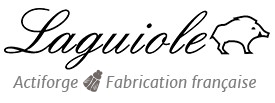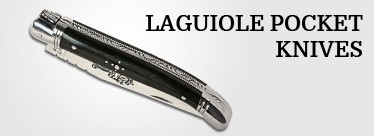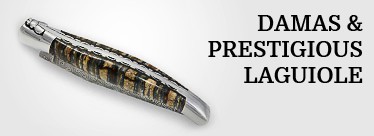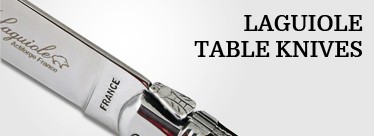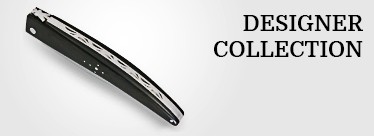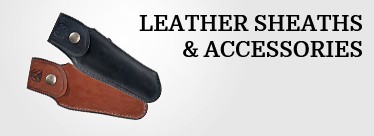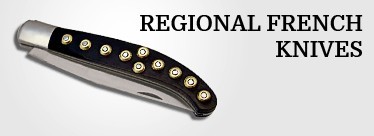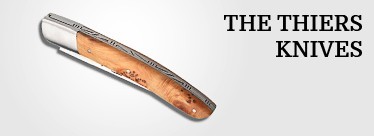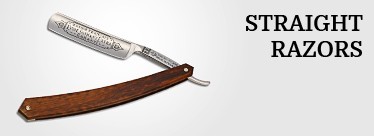Damascus steel Laguiole knives are made by experienced blacksmiths, passionate about unique-looking fine blades.
1 What is Damascus steel ? Definition and explanations.
One of the best ways to define it is this : Damascus steel forges precious metal out of ordinary ones.
Damascus is born of the combination of two metals (iron and steel – but also...
Damascus steel Laguiole knives are made by experienced blacksmiths, passionate about unique-looking fine blades.
1 What is Damascus steel ? Definition and explanations.
One of the best ways to define it is this : Damascus steel forges precious metal out of ordinary ones.
Damascus is born of the combination of two metals (iron and steel – but also nickel), dissolved carbon and alloys. The metals are welded and folded together, resulting in a sort of ‘cake’ – the very distinctive patterns are then revealed using a revealing acid.
Damascus blades are created through a very specific melting process. Making a Damascus blade requires assembling several types of steel welded together and folded in layers, which gives such a beautiful aspect to the blade. Making a Damascus blade is in a way similar to making puff pastry, but with steel, and it requires as much skill, know-how and patience, all this for the greatest pleasure of Laguiole knives connoisseurs.
Damascus steel is created by selecting two or more types of steel, placing them in a forge, heating them up to welding temperature (approximately 2000-2100 °C), then taking them out and hammering them rapidly into a single piece of solid steel.
Two conditions are required to achieve the qualities of Damascus steel.:
1. The metal must be able to perfectly weld to the other Damascus raw materials
2. It must provide contrast during the acid etching step of the process.
Only five materials possess such qualities : iron, nickel, steel (with varying carbon rates), and iron or steel and nickel alloys (with different rates).
2 Are there different types of Damascus steel ?
Yes, there are many Damascus steels – for a very simple reason : Damascus is born of a combination of metals and the possibilities are infinite and dependent on the blacksmith’s skills and creativity.
This kind of Damascus steel is called pattern-welded Damascus steel. There is another type of Damascus blades, born of cristallization. The end-result is called Wootz steel.
What History tells us…
Damascus technique is as old as metal-working itself ! The first Damascus appeared as soon as people tried to create homogeneous cakes from different metals. Some Damascus swords date back to the Gauls !
Concerning the discovery of acid-etching, it probably occurred after some tanner’s tools were dipped into acid baths used for leather processing.
The word Damascus appeared towards the end of the 18th century (circa 1775), when this technique was rediscovered. At that time, itw as mainly used to produce luxury rifle barrels. From the same period, some sabers and hunting daggers have also been found – all made with great finesse.
If in Europe the most common damascus steels forged are the pattern-welded ones, wootz damascus are predominantly forged in Syria, Persia and Egypt.
3 Advantage of Damascus steel.
Damascus steel solidity can easily be summed up in one equation : 1+1=3. The sum of a blade’s qualities is greater than the sum of the parts taken separately.
Just like reinforced concrete, the steel parts go solid when tempered and give the blade its hardness while the iron parts make it flexible and prevent the breaking of the hard parts. It is said that a Damascus blade is three times stronger than a simple homogeneous blade.
This hardness is due to some very technical forging know-how, which also accounts for the selling price of the Laguiole Damascus knives. Ferrous metals are quite difficult to weld together, and they require significant experience and distinctive skills.
Fun fact : The time required to make a Damascus steel sword in the 9th century is estimated to be 15 days (full time) – add to this the month required to make the 3 kg of necessary steel and you’ll realize what colossal work it was!
4 Who are Laguiole’s Damascus bladed knives for ?
Laguiole’s Damascus knives are for true connoisseurs of cutlery-making, people who have a fine appreciation of beautiful blades.
Treat yourself to a knife made in the purest tradition of luxury knife-making. Made to order and customizable, buy yourself a Laguiole in your image : refined and unique.
There are no two Damascus twisted stainless steel blades alike.
Each Damascus knife we offer features a handle made of precious materials such as ebony or ivory.
Discover our beautiful knives which will no doubt be the highlights of your collection.
Damas Laguiole Collection
- 1
- 2
